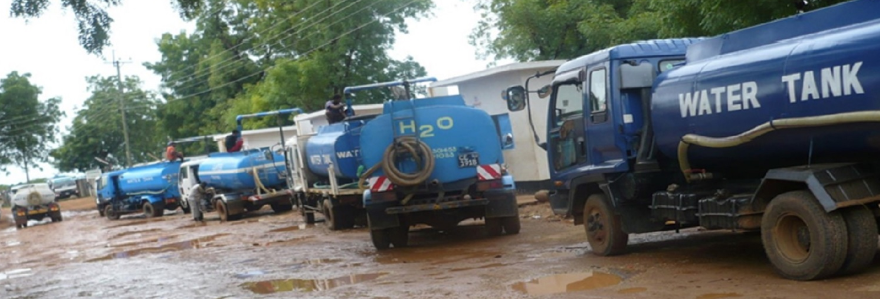As South Sudan marked World Water Day, scores of citizens in the capital Juba and thousands across the country still struggle to get clean drinking water.
World Water Day is commemorated annually on 22 March to focus on the importance of clean water and advocate for the sustainable management of freshwater resources. This year it is about accelerating change to solve the water and sanitation crisis.
Speaking to Radio Tamazuj on Wednesday in Juba, Anthony Sebit, a resident of Jebel Timan south of the suburb of Gudele, said his family has challenges accessing clean water given their distance from the city centre.
Currently, residents in Munuki, Juba, Kator and Gumbo-Sherikat areas buy a 200-litre drum of water from suppliers at SSP 1,000, but the same goes for 1,500 in Gudele and other far-flung residential areas.
Sebit says his family typically relies on water supplied by operators of water tank trucks who sometimes do not reach his locality because of the distance. He also says the tanks are dirty and unhygienic.
“The challenge is that the trucks supply water from the River Nile which is far from us,” he says. “We are also not sure about the cleanness of this water. Sometimes we go to the clinic for a checkup and find that we are sick just because of this water.”
Currently, it is estimated that only 55 percent of South Sudanese have access to safe drinking water. Crude oil leakages and spills in oil-producing areas have also led to contamination of surface water, while seepage from oil fields has increased salinity and concentrations of heavy metals in groundwater.
Last week President Salva Kiir commissioned the water supply system in Juba built by the Japanese government, which will reach about 350,000 city residents.
When asked about the new water system, Sebit commended the Government of Japan for constructing it but said most people will not benefit from it because it only supplied the immediate environs of the city.
“That water system may benefit some few people within the capital, but then some of us who are very far from the heart of the city will not benefit,” he says.
Mawa Mike, a resident of Mangaten in the Munuki residential area, also urged the government to supervise the operators of water trucks to ensure that the water they supply is treated.
“Water is a big problem in Juba. We normally survive on these water tankers which deliver water house to house, but their prices are not stable,” he explains. “Each time the dollar rate goes up, they also increase prices. Most importantly, they have to ensure that the water has been treated so that we do not regularly contract typhoid and other diseases.”
Another Munuki resident, who only identified herself as Cissy, says that when it rains, the water trucks cannot access her home due to the bad state of the roads.
“One thing about getting clean drinking water in the city is that when it rains, some trucks do not even reach some areas,” she says.
On 28 July 2010, the United Nations General Assembly adopted a historical resolution recognizing “the right to safe and clean drinking water and sanitation as a human right that is essential for the full enjoyment of life and all human rights.”
On his part, Simon Kuoth, the Director General at Juba Urban Water Cooperation, acknowledged that more than the recently launched water system is required to distribute clean water to the whole population of Juba.
“What happened is that Japan International Cooperation Agency (JICA), which granted the project to the people of South Sudan, only constructed 120 points within Juba City from which the water can be drawn and there are also points for water tankers,” he explains. “There is a plan to increase the area of coverage and distribution of water in phase two.”
He urges the people to be calm as the government is working with its partners to ensure clean drinking water reaches every household.




